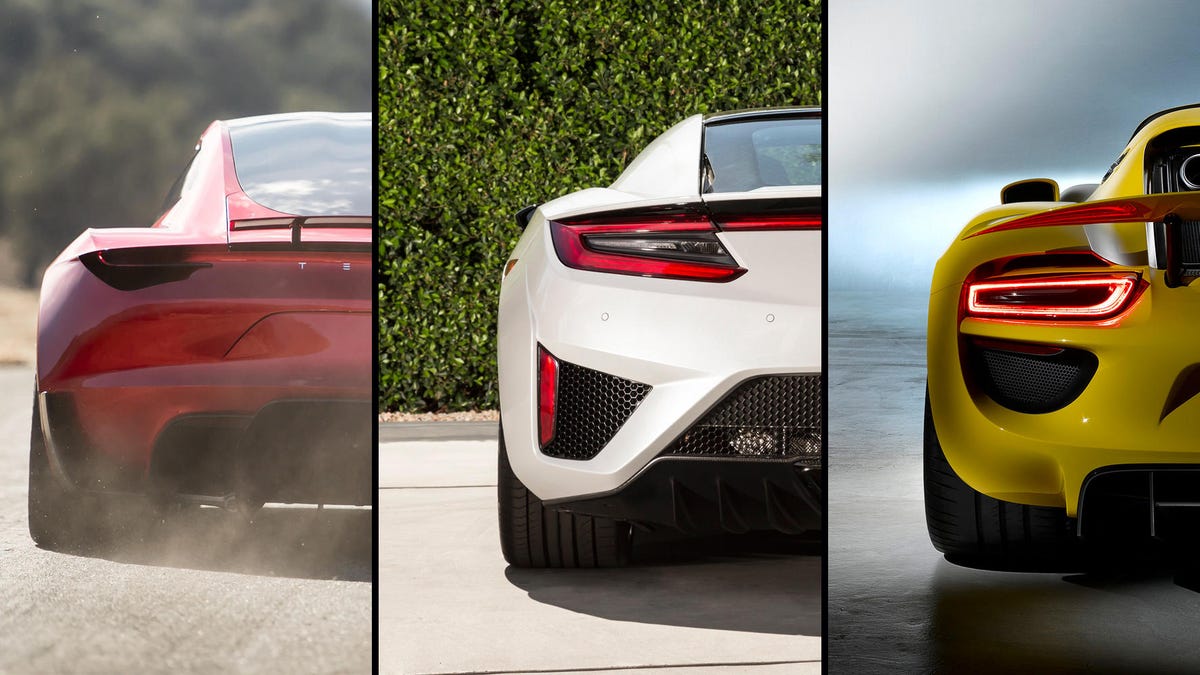By the numbers: Tesla Roadster vs. Acura NSX vs. Porsche 918 Spyder
How does Tesla’s new performance machine stack up against two other electrified supercars?

The performance claims Elon Musk uttered last week about the new Tesla Roadster are still being digested by the car community. Musk didn't go deep into details during the surprise unveiling, but the torque, track and driving range numbers he did share are simply remarkable.
How remarkable are they? Take a look at how they stack up against two other electrified supercars in the Acura NSX and Porsche 918 Spyder to draw your own conclusion.
The muscle
The new Tesla Roadster will feature a three electric motor drivetrain with one unit on the front axle and two driving the rear wheels, effectively making it all-wheel drive. A 200-kWh battery pack powers the trio of motors.
Musk claims the Roadster puts out 7,375 pound-feet of torque at the wheels, which is a figure no other automaker publishes (traditional torque output is measured at the crankshaft). It's also impossible to reverse-engineer a crank torque figure without knowing the reduction ratio in the transmission, which Tesla definitely has not published. If you use the same 9.71:1 ratio as the Model S, you get a still-hefty figure of 760 pound-feet, but there's no guarantee that ratio is the one in the Roadster. Tesla likes big numbers for marketing purposes, despite creating confusion, if you couldn't tell.
For comparison's sake, the 2018 Dodge Challenger SRT Demon sends about 10,000 lb-ft to the wheels at launch, so the Roadster is a bit less brutal than that.
Power
| Tesla Roadster | Acura NSX | Porsche 918 Spyder | |
| Drivetrain | Three motors | 3.5-liter twin-turbo V6 hybrid | 4.6-liter V8 plug-in hybrid |
| Horsepower | n/a | 573 | 887 |
| Crank Torque (lb-ft) | n/a | 476 | 944 |
| Battery Capacity (kWh) | 200 | 1.3 | 6.8 |
Acura's NSX uses a 3.5-liter twin-turbocharged V6 hybrid with a net system output of 573 horsepower and 476 pound-feet of torque (at the crank, where it should be measured). The engine and one electric motor power the rear wheels, while two electric motors motivate the front wheels to also make it all-wheel drive. Power for the NSX's three motors comes from a 1.3-kWh battery.
The Porsche 918 Spyder is a plug-in hybrid that uses a 4.6-liter V8 with two electric motors. One motor works with the engine to provide extra kick to the rear wheels. The other powers the front axle of the all-wheel-drive 918. The motors powered by a 6.8-kWh battery and gas engine combine to deliver 887 horsepower and 944 pound-feet of torque.
World-beating performance
Tesla says the new Roadster will sprint to 60 mph in an astonishing 1.9 seconds. This bests both the NSX (3.1 seconds) and the 918 (2.5 seconds). It's likely the same story in the sprint to 100 mph, with the Tesla achieving that speed in 4.2 seconds. No official 100 mph times are available for the other two, but an educated guess puts the Acura at 7.2 seconds and the Porsche at 4.9 seconds.
Performance
| Tesla Roadster | Acura NSX | Porsche 918 Spyder | |
| 0-60 mph (sec) | 1.9 | 3.1 (est.) | 2.5 |
| 0-100 mph (sec) | 4.2 | 7.2 (est.) | 4.9 (est.) |
| Quarter-mile (sec) | < 8.0 | 11.2 (est.) | 9.9 |
| Top speed (mph) | 250+ | 191 | 214 |
In a quarter-mile sprint, the Roadster won't even need 8 seconds to cross the line. The NSX should do it in roughly 11.2 seconds, and the 918 Spyder (with the optional Weissach Package) needs 9.9 seconds. It bears pointing out that the Roadster will have similar issues as the Demon when it comes to drag racing -- NHRA tracks will not permit vehicles running the quarter in under 9.99 seconds without a whole load of safety gear, none of which comes with the Roadster from the factory.
For top speed runs, the Roadster is also the one you'll want, with a max velocity of more than 250 mph leaving the 191-mph Acura and 214-mph Porsche in the dust.
What's also worth noting is that Musk says the announced performance figures are for the base Roadster. An optional package is also in the works to improve the Roadster's performance further. We'll hear details on that some time next year.
The price of power
Base pricing for the new Roadster is set at $200,000, with deliveries expected to begin in 2020. A special Founders Series is also available for $250,000, but production is capped at 1,000 units. The Tesla's cost of entry is certainly heftier than the $156,000 NSX, but is a relative bargain compared to the $845,000 918 Spyder ($929,000 with Weissach Package).
However, while you can still buy a factory-fresh NSX off the showroom floor, the 918 was sold out years ago.
There are also practicality arguments to the new Tesla sports car, with seating for four passengers, while the others can only carry two. And the Roadster features a bladder-busting driving range of 620 miles on a single charge, while the Acura has a driving range of 328 miles and the Porsche can cover 420 miles on a tank of gas, according to EPA figures. Your bladder is likely to give up well before the Roadster depletes its battery.
Price and practicality
| Tesla Roadster | Acura NSX | Porsche 918 Spyder | |
| Base price | $200,000 | $156,000 | $845,000 |
| Driving range (miles) | 620 | 328 | 420 |
| Seating | 4 | 2 | 2 |

